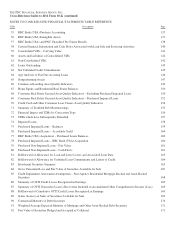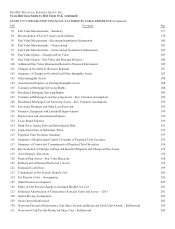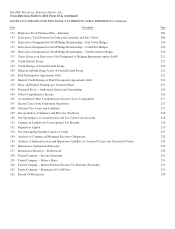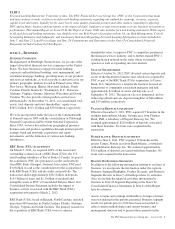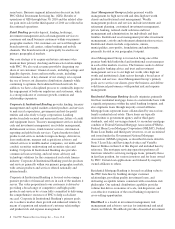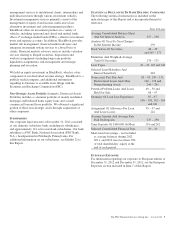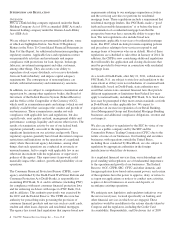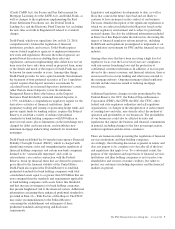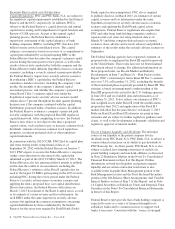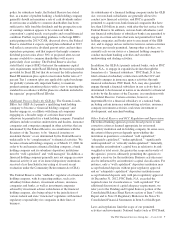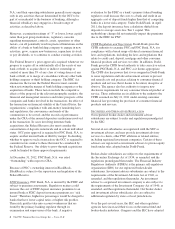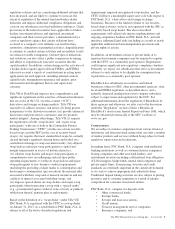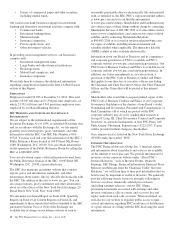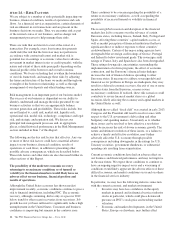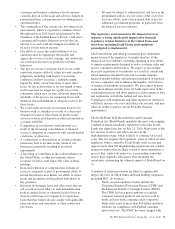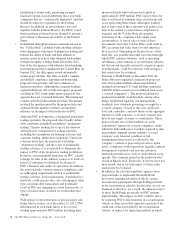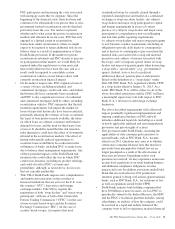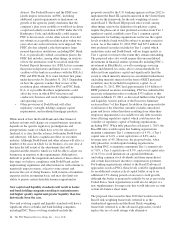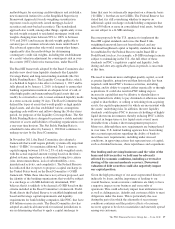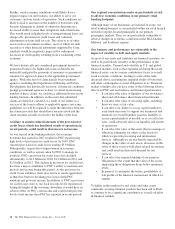PNC Bank 2012 Annual Report Download - page 27
Download and view the complete annual report
Please find page 27 of the 2012 PNC Bank annual report below. You can navigate through the pages in the report by either clicking on the pages listed below, or by using the keyword search tool below to find specific information within the annual report.
N.A.) and their operating subsidiaries generally may engage
only in any activities that are determined by the OCC to be
part of or incidental to the business of banking, although a
financial subsidiary may engage in a broader range of
activities as described above.
Moreover, examination ratings of “3” or lower, lower capital
ratios than peer group institutions, regulatory concerns
regarding management, controls, assets, operations or other
factors, can all potentially result in practical limitations on the
ability of a bank or bank holding company to engage in new
activities, grow, acquire new businesses, repurchase its stock
or pay dividends, or to continue to conduct existing activities.
The Federal Reserve’s prior approval is required whenever we
propose to acquire all or substantially all of the assets of any
bank or thrift, to acquire direct or indirect ownership or
control of more than 5% of any class of voting shares of any
bank or thrift, or to merge or consolidate with any other bank
holding company or thrift holding company. The BHC Act
enumerates the factors the Federal Reserve must consider
when reviewing the merger of bank holding companies or the
acquisition of banks. These factors include the competitive
effects of the proposal in the relevant geographic markets; the
financial and managerial resources and future prospects of the
companies and banks involved in the transaction; the effect of
the transaction on financial stability of the United States; the
organizations’ compliance with anti-money laundering laws
and regulations; the convenience and needs of the
communities to be served; and the records of performance
under the CRA of the insured depository institutions involved
in the transaction. In cases involving interstate bank
acquisitions, the Federal Reserve also must consider the
concentration of deposits nationwide and in certain individual
states. OCC prior approval is required for PNC Bank, N.A. to
acquire another insured bank or thrift by merger. In deciding
whether to approve such a transaction, the OCC is required to
consider factors similar to those that must be considered by
the Federal Reserve. Our ability to grow through acquisitions
could be limited by these approval requirements.
At December 31, 2012, PNC Bank, N.A. was rated
“Outstanding” with respect to CRA.
Because of PNC’s ownership interest in BlackRock,
BlackRock is subject to the supervision and regulation of the
Federal Reserve.
FDIC Insurance. PNC Bank, N.A. is insured by the FDIC and
subject to premium assessments. Regulatory matters could
increase the cost of FDIC deposit insurance premiums to an
insured bank as FDIC deposit insurance premiums are “risk
based.” Therefore, higher fee percentages would be charged to
banks that have lower capital ratios or higher risk profiles.
These risk profiles take into account weaknesses that are
found by the primary banking regulator through its
examination and supervision of the bank. A negative
evaluation by the FDIC or a bank’s primary federal banking
regulator could increase the costs to a bank and result in an
aggregate cost of deposit funds higher than that of competing
banks in a lower risk category. Under Dodd-Frank, in April
2011, the deposit insurance base calculation shifted from
deposits to average assets less Tier 1 capital. This
methodology change did not materially impact the premiums
due to the FDIC for PNC.
CFPB Regulation and Supervision. Dodd-Frank gives the
CFPB authority to examine PNC and PNC Bank, N.A. for
compliance with a broad range of federal consumer financial
laws and regulations, including the laws and regulations that
relate to credit card, deposit, mortgage and other consumer
financial products and services we offer. In addition, Dodd-
Frank gives the CFPB broad authority to take corrective action
against PNC Bank, N.A. and PNC as it deems appropriate.
The CFPB also has powers that it was assigned in Dodd-Frank
to issue regulations and take enforcement actions to prevent
and remedy acts and practices relating to consumer financial
products and services that it deems to be unfair, deceptive or
abusive. The agency also has authority to impose new
disclosure requirements for any consumer financial product or
service. These authorities are in addition to the authority the
CFPB assumed on July 21, 2011 under existing consumer
financial law governing the provision of consumer financial
products and services.
S
ECURITIES AND
D
ERIVATIVES
R
EGULATION
Our registered broker-dealer and investment adviser
subsidiaries are subject to rules and regulations promulgated
by the SEC.
Several of our subsidiaries are registered with the SEC as
investment advisers and may provide investment advisory
services to clients, other PNC affiliates or related entities,
including registered investment companies. Certain of these
advisers are registered as investment advisers to private equity
funds under rules adopted under Dodd-Frank.
Broker-dealer subsidiaries are subject to the requirements of
the Securities Exchange Act of 1934, as amended, and the
regulations promulgated thereunder. The Financial Industry
Regulatory Authority (FINRA) is the primary self-regulatory
organization (SRO) for our registered broker-dealer
subsidiaries. Investment adviser subsidiaries are subject to the
requirements of the Investment Advisers Act of 1940, as
amended, and the regulations thereunder. An investment
adviser to a registered investment company is also subject to
the requirements of the Investment Company Act of 1940, as
amended, and the regulations thereunder. Our broker-dealer
and investment adviser subsidiaries also are subject to
additional regulation by states or local jurisdictions.
Over the past several years, the SEC and other regulatory
agencies have increased their focus on the mutual fund and
broker-dealer industries. Congress and the SEC have adopted
8The PNC Financial Services Group, Inc. – Form 10-K


